TOP STORY - Inspiring Story of Eric Koning
XK Patient's Family Honors Patient's Last Wish - Brain Tissue Donation
by Madelon Koning
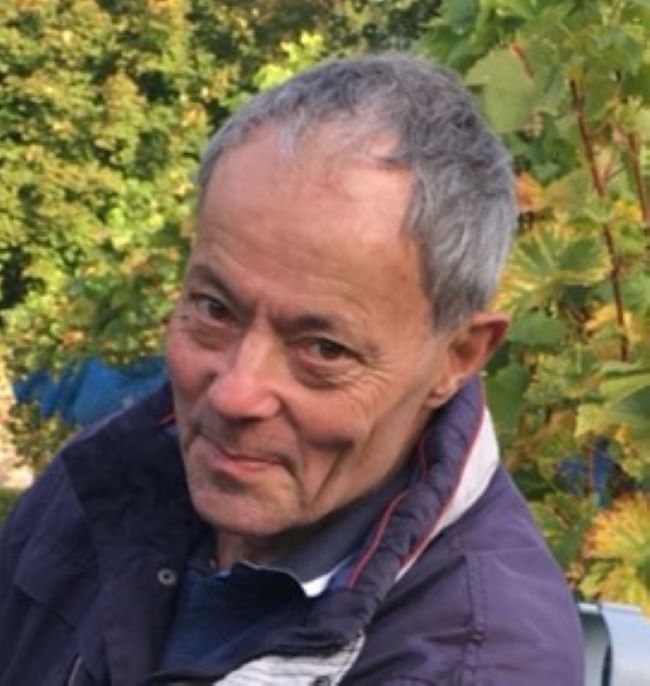
Thank you for reading this 45th edition of NA News. Inside this issue, we remember the inspirational story of Eric Koning, a XK patient and brain tissue donor, and there is news of new research being undertaken on XK disease. Additionally, you will find stories on the latest VPS13 forum, an update on Rare Disease Day 2024 activities, and news about the upcoming forum on July 29th. Patient Alex and her voice coach share the benefits of voice workouts, while patient Bob trips the light fantastic in dancing class. You will discover articles on genetic testing and resources for patients and their families, and we shine a light on charity manager Despina's recent fundraising efforts. Read on, learn and enjoy...
As wife and children of Eric Koning, we want to share with other patients/family members our experiences over recent years. Eric carried the rare condition McLeod/XK disease. He passed away on the 14th of December 2023 at age of 70 years old, in Zeist, The Netherlands.
Eric was a very independent person with a strong character. He dealt with his condition in such a brave and courageous way that resulted in a lot of respect from friends and family alike. Despite the difficulties his condition presented (such as restless legs, general unrest, chorea, spasms, muscle weakness, bruxism, sleeping problems etc.) he never complained and always had a positive attitude towards life. Nevertheless, he really felt isolated in his situation and unfortunately we were not able to find other McLeod patients in The Netherlands.
We really believe Eric’s condition would have deteriorated far quicker had he not had such an active lifestyle. He made sure he was active every single day, walking behind his walker and/or cycling on his tricycle e-bike. He also found other ways such as Qigong enabling him to focus on body and mind which gave him energy. Meditative music and meditation helped him to find rest in his life and to aid him in sleeping.
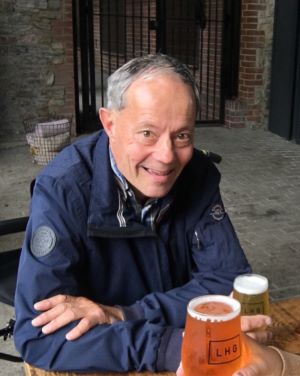 Unfortunately, we decided to find a nursing home (for Huntington patients) since Eric’s deteriorating condition became unmanageable at home. This was a difficult decision for the whole family, despite the excellent and appropriate expertise in this nursing home. Unfortunately, we decided to find a nursing home (for Huntington patients) since Eric’s deteriorating condition became unmanageable at home. This was a difficult decision for the whole family, despite the excellent and appropriate expertise in this nursing home.
We have been able to complete Eric’s last wish to contribute his brain tissues for systematic study into McLeod/XK disease.
Eric will be terribly missed, however, he left us with a valuable lesson of how we should all live our lives to the fullest, in whatever time we have been given.
- Madelon (wife), Elout (son) and Marcelline (daughter).
 |
|
 |  |
NA Advocacy USA Awards $100,000 Grant for Brain Research
Researchers at the Icahn School of Medicine at Mount Sinai to Focus on XK Disease (McLeod syndrome)
by Joy Willard-Williford and Ruth Walker
 NA Advocacy USA, Inc. recently finalized a third grant to the Icahn School of Medicine at Mount Sinai in New York City for the purpose of continuing the very successful “Neuropathology of Neuroacanthocytosis Syndromes Project.” The focus of the research will be on tissue of XK patients. NA Advocacy USA, Inc. recently finalized a third grant to the Icahn School of Medicine at Mount Sinai in New York City for the purpose of continuing the very successful “Neuropathology of Neuroacanthocytosis Syndromes Project.” The focus of the research will be on tissue of XK patients.
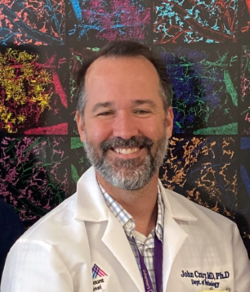 This latest grant from NA Advocacy USA brings the total funded for the project over three years to $250,000. While NA Advocacy USA is the lead grantor on the project, it is important to note that generous donations made by long term American supporters of The Advocacy for Neuroacanthocytosis Patients, the UK-based charity, have helped to make the grant possible. This latest grant from NA Advocacy USA brings the total funded for the project over three years to $250,000. While NA Advocacy USA is the lead grantor on the project, it is important to note that generous donations made by long term American supporters of The Advocacy for Neuroacanthocytosis Patients, the UK-based charity, have helped to make the grant possible.
The first two grants funded research involving brain tissue of VPS13A patients and yielded two scientific papers and several new observations. (See NA News Issues 42 and 43 at https://naadvocacy.org/na-news/ for details). Both papers were published in the prestigious Official Journal of the International Parkinson and Movement Disorder Society, in addition to the results being presented at various international scientific conferences over the past 3 years.
While the first two grants focused on VPS13A, the current grant will fund a parallel study with a focus on XK disease (McLeod syndrome). The work will, once again, be performed in the lab of Dr. John Crary in the Pathology Department at Mount Sinai School of Medicine under the guidance of Drs. John Crary and Ruth Walker (shown in photos to the right).
This research highlights the critical importance of brain tissue donations like that of Eric Koning. We are grateful to the Koning family and the other families and patients who made this often difficult decision.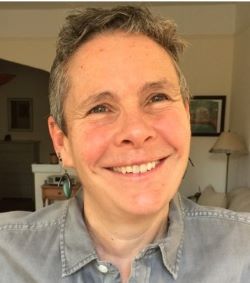
 |  |
Save the Date! The 18th VPS13 Forum to be Held on July 29th
Topic: Nutritional challenges among people with feeding dystonia and Medical Q&A
by Adrian Danek, Kevin Peikert, & Ruth Walker, VPS13 Forum Organizing Team
 You won't want to miss this important forum on a common challenge to both our VPS13A and XK patients - nutrition. If time permits, there will be a medical Q & A session. Read on for details... You won't want to miss this important forum on a common challenge to both our VPS13A and XK patients - nutrition. If time permits, there will be a medical Q & A session. Read on for details...
18th VPS13 Forum:
Nutritional challenges among people with feeding dystonia and Medical Q&A
Monday, July 29th, 2024
from 2:00-4:00 pm CEST/UTC+2 (Central European Summer Time)
from 8:00-10:00 am EDT/UTC-4 (Eastern Daylight Time)
from 9:00-11:00 pm JST/UTC+9 (Japan Standard Time)
Z O O M L I N K
https://lmu-munich.zoom-x.de/j/96713877799?pwd=QTZZSmdhVUxqM1hmQTZ4UlZqZU9FUT09
Meeting-ID: 967 1387 7799
Passcode: 555812
A G E N D A
Advocacy updates
Representatives of the Neuroacanthocytosis Advocacies
Nutritional challenges among people with feeding dystonia
Martin Paucar, MD, PhD, (neurologist; Department of Clinical Neuroscience, Karolinska Institutet, and Department of Neurology, Karolinska University Hospital, Stockholm, Sweden), Charlotta Rubin (MSc, dietitian; Department of Neurology, Karolinska University Hospital, Stockholm, Sweden), Josefin Kyhle (speech and language pathologist; Department of Neurology, Karolinska University Hospital, Stockholm, Sweden).
Feeding dystonia is considered a hallmark of VPS13A disease but affects also people with XK disease. Here we will discuss how to manage feeding dystonia and swallowing difficulties in patients with these rare diseases. We are assessing the prevalence of feeding dystonia among people with VPS13A disease and exploring a rating scale to better evaluate this problem.
There will be a 30 minute presentation followed by a discussion and Q&A session with the speakers and Elina Tripoliti (clinical specialist Speech Language Therapist in movement disorders, National Hospital for Neurology and Neurosurgery, London, UK). Please submit your questions or other comments for discussion, before Monday July 22nd to Despina Dinca, despinadinca@naadvocacy.org.
If time permits, Drs. Paucar, Peikert, Danek, and Walker will answer questions related to other issues in VPS13A and XK diseases. Please submit these in advance by Monday July 22nd to despinadinca@naadvocacy.org.
We hope to see many of you at the event, which we hope will result in an extensive exchange of observations and ideas. Apart from the presentations, the discussion is the main focus of the forum.
The next meeting of the VPS13 forum is scheduled for Oct 28th.
With our best wishes,
Adrian Danek, Kevin Peikert & Ruth Walker
VPS13 Forum organizer team
 |  |
Reporting on 17th VPS13 Forum, 29 April 2024
Read about the interesting presentations given at the most recent Forum which took place on 29 April 2024
by Despina Dinca
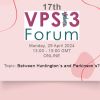 The topic was focused on examining the links between Huntington's and Parkinson's diseases and neuroacanthocytosis syndromes (XK and VPS13A diseases). The topic was focused on examining the links between Huntington's and Parkinson's diseases and neuroacanthocytosis syndromes (XK and VPS13A diseases).
At the 17th Forum on 29 April 2024, our NA syndromes community was joined by the communities of those interested and affected by Huntington’s Disease (HD), which shares some common ground from research point of view with the neuroacanthocytosis (NA) syndromes.
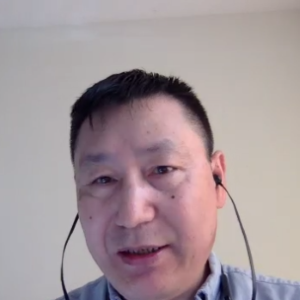 Dr Xueyi Li, Assistant Professor of Neurology at Harvard Medical School, Department of Neurology, Massachusetts General Hospital (photo to the right) presented his research investigations on how protein transport can malfunction in neurodegenerative disorders such as HD and Parkinson’s. The study provides a link between Huntingtin and XK (responsible for McLeod disorders). While it appears that the VPS13A and XK interaction is unaltered in HD cells, there are still unknown aspects which remain to be studied in the future. Dr Xueyi Li, Assistant Professor of Neurology at Harvard Medical School, Department of Neurology, Massachusetts General Hospital (photo to the right) presented his research investigations on how protein transport can malfunction in neurodegenerative disorders such as HD and Parkinson’s. The study provides a link between Huntingtin and XK (responsible for McLeod disorders). While it appears that the VPS13A and XK interaction is unaltered in HD cells, there are still unknown aspects which remain to be studied in the future.
Professor Bernhard Landwehrmeyer, European Huntington’s Disease Network (EHDN) presentation focused on the alterations in lipid metabolism and lipid composition in HD. A speculative hypothesis looks at the alterations of lipid metabolism in the brain as a shared feature between HD and VPS13A / XK diseases due to the many clinical and pathological aspects they have in common. He also spoke about research in HD mice. This looked at the cholesterol in their brains and found a successful treatment to restore it to the healthy level. However, this is yet to be translated into therapies testable in patients and gene therapy may be a possible way forward. (Professor Landwehrmeyer's photo is to the right below.)
So, keeping in touch and understanding the evolution of the HD research is crucial for collaboration with our NA community of scientists.
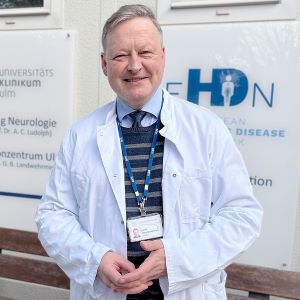 For those less familiar with our Forums, these are regular online meetings where clinicians, researchers and patients, their families & carers are keeping the conversations going on latest news and updates in the world of NA syndromes. For those less familiar with our Forums, these are regular online meetings where clinicians, researchers and patients, their families & carers are keeping the conversations going on latest news and updates in the world of NA syndromes.
Although sometimes the scientific discussions may be a bit challenging to follow for the non-medical public, we will make these accessible in lay language as soon as possible after the meeting.
We publicise the details for joining on our social media channels, so keep an eye out nearer the time of the meeting. Alternatively, you can ask to be included on the Forum’s mailing list by emailing Dr Kevin Peikert.
Next meetings coming up in 2024: 29 July (see the dedicated article included in this newsletter) and 28 October. Mark your calendars now!
 |  |
Voice Workouts
Maintaining and improving oral communication is an important therapy for patients diagnosed with VPS13A or XK disease.
by Alex Irvine and Elina Tripoliti
 Dr. Elina Tripoliti, speech therapist from University College London, and Alex Irvine, VPS13A patient, share the daily voice workout they’ve been using. It doesn’t need to be something complicated, but it’s important to do it every day. Dr. Elina Tripoliti, speech therapist from University College London, and Alex Irvine, VPS13A patient, share the daily voice workout they’ve been using. It doesn’t need to be something complicated, but it’s important to do it every day.
 To help you better understand their voice workout, Alex and Elina have shared their workout on The Advocacy for Neuroacanthocytosis Patients' newly launched YouTube channel. Check it out here: their 4-minute video! To help you better understand their voice workout, Alex and Elina have shared their workout on The Advocacy for Neuroacanthocytosis Patients' newly launched YouTube channel. Check it out here: their 4-minute video!
If you can’t access the video, use these easy-to-follow steps for any daily voice workout:
- Clear your throat. Have a glass of water handy, maybe with a straw.
- Take a deep breath and say /AAAAAAAA/ for as long and as LOUD as you can.
- Take a deep breath, start from your comfortable pitch, and go as high as you can for just 5 seconds. Don't forget to be LOUD!
- Take another deep breath, start from your comfortable pitch and go as low as you can for just 5 seconds. Be even LOUDER!
- Repeat the above 5 times.
You may find that reading is your thing. Poetry reading could be enjoyable. Alex certainly enjoys it. Consider starting with poems you know by heart and recite them as LOUD as you can.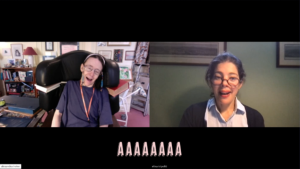
A couple of Alex’s favourites: Macavity the mystery cat, The owl and the pussy cat.
Or you could even try Alex’s own book, Coco the Pussycat!
Elina and Alex have a lot more to share, and they’ve already lined up more tips and tricks. Don’t forget to like and share the new video with anyone who it may be of interest to.
So, stay tuned, keep practising every day, and come back for more!
Please note: the concept of Loudness as a useful intensive voice workout is from a very well researched program called Lee Silverman Voice Treatment (LSVT LOUD) and you can find more information on www.lsvtglobal.com.
 |  |
Wellbeing Hub, a useful collection of resources
On the hunt for resources? Check out Wellbeing Hub
by Despina Dinca
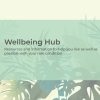 Living with a rare disease can be psychologically and emotionally demanding. The challenges can be diverse and often complex, too. So, it’s important for everyone affected by a rare disease to look after themselves and to know where to find the right resources to help and support them. Living with a rare disease can be psychologically and emotionally demanding. The challenges can be diverse and often complex, too. So, it’s important for everyone affected by a rare disease to look after themselves and to know where to find the right resources to help and support them.
Rareminds is the first specialist, non-profit, rare disease counselling and psychotherapy service in the UK (and possibly globally). Their newly launched Wellbeing Hub is a collection of information and resources to help those affected by a rare disease to live as well as possible.
They cover a wide range of very complex topics:
- Diagnosis – whether genetic testing is considered, or it’s already been done and you’re waiting for results, there will be lots of emotions at these different stages. Even when receiving a diagnosis, there will likely still be uncertainty about the future and the adjustments that will be required.
- Uncertainty, change & loss – undoubtably some of the most sensitive topics, these are explained in depth with helpful examples and, most importantly, with professional advice and useful links and resources.
- Relationships – inevitably relationships will undergo some strain as you navigate complex, difficult feelings and behaviours. Knowing when and how to speak to others around you about the rare condition will likely not be easy or straightforward.
- You & your feelings – the thorough approach on the basics of wellbeing and understanding difficult feelings offers a comprehensive learning platform, with practical advice, therapist tips and techniques for mindfulness, relaxation and coping strategies.
- Navigating healthcare – those affected will face a complex maze of appointments, tests, scans, procedures and interactions with multidisciplinary teams, all while either living independently at home or as an in-patient. While some of the information refers to paediatric care, which doesn’t really apply for either VPS13A or XK patients, there is some useful, more general advice about understanding how to develop new ways of communicating and managing concerns.
- Sources of support – this is a collection of different types of support, including rare disease organisations, general mental health support, financial, social care and educational support, and crisis support.
We appreciate this is a mostly UK-oriented resource while we do address a global audience. We would encourage you to see if there is anything similar to this Wellbeing Hub that is more localised to support your needs better. And we’d love to hear from you if you can share any other similar international initiatives.
You can drop Despina an email at despinadinca@naadvocacy.org or approach us on any of our social media channels.
 |  |
Toe-tapping XK Patient
by Bob Metzger
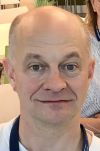 The ever-talented Bob Metzger shares his experience with tap dancing, and how it brings him joy while also engaging his brain. The ever-talented Bob Metzger shares his experience with tap dancing, and how it brings him joy while also engaging his brain.
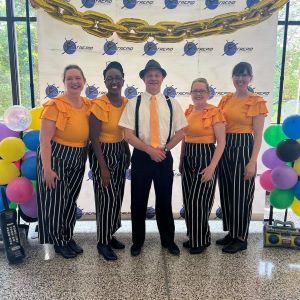 The dance style is 'tap dancing'. I did not take formal dance classes as a youth, which is common practice. I participated in my first dance class in 2002 at age 31 and kept up with it for about 3 years at that time. Participation went on hold for several years, but I recently picked it back up again in 2022. I love choreographed dancing because it is such a multifaceted activity that engages and involves - music, health (physically, socially, intellectually), multiple areas of the brain and just an overall fun experience. The dance style is 'tap dancing'. I did not take formal dance classes as a youth, which is common practice. I participated in my first dance class in 2002 at age 31 and kept up with it for about 3 years at that time. Participation went on hold for several years, but I recently picked it back up again in 2022. I love choreographed dancing because it is such a multifaceted activity that engages and involves - music, health (physically, socially, intellectually), multiple areas of the brain and just an overall fun experience.
It's interesting to note that as I'm getting older I am seeing that I'm starting to lose some neurologic functioning and cannot quite execute certain steps that I used to be able to at the speed (tempo) of the music we perform to. I still get out there and do my best and have fun engaging my brain as I connect the coordination of moving my body in choreographed steps to the timing of music.
(A dapper Bob Metzger and several of his dancing partners in the photo above.)
 |  |
Genetic Testing
The Advocacy's charity manager, Despina Dina, reports on a series of webinars she and Ginger Irvine attended on genetic testing
by Despina Dinca
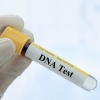 Genetic testing – how easy or complicated can it make things for someone looking to obtain an accurate diagnosis for themselves or someone related to them? We attended a series of webinars called Decoding Diagnostics that offered a lot of useful information about genetic testing. This is a summary of what we learned, and we will publish more details on our new websites coming later this year. Genetic testing – how easy or complicated can it make things for someone looking to obtain an accurate diagnosis for themselves or someone related to them? We attended a series of webinars called Decoding Diagnostics that offered a lot of useful information about genetic testing. This is a summary of what we learned, and we will publish more details on our new websites coming later this year.
A genome is an organism’s complete set of DNA. The DNA is inherited from parents. In humans, the genome consists of 23 pairs of chromosomes, all the information needed for an individual to develop and function. The genes are pieces of DNA and are present in every cell in our bodies. Each gene has a special function. Any change in the DNA sequence can alter one’s genetic code, and a gene may become unable to perform its normal function.
Currently 70% to 80% of rare diseases are of genetic nature. Genetic testing is meant to find changes in genes that can cause health problems. It has its origins in the 1950s. Methods and principles have been developed over the years, and it has become a complex landscape, with terminology and new processes evolving all the time.
According to the National Health Service (NHS) UK, a genetic test can:
- help to diagnose a rare health condition
- help to understand whether an inherited health condition may affect you / your family members
- show if you are at higher risk of developing certain health conditions
- guide doctors in deciding what medicine or treatment to prescribe
- guide doctors on eligibility to join a clinical trial.
Genetic counselling will most commonly precede any initiation of the actual genetic testing. A genetic counsellor will support with understanding the implications of genetic testing for the subject and their family.
Also, depending on where you are in the world, the cost implications for taking a genetic test may vary substantially and may affect the final decision on whether to take the test.
The effective genetic testing is initiated with the DNA collection, and it goes through a number of complex steps before it gets to the sequencing stage.
Depending on the reason for the test, getting the result may take weeks or months, and it may even involve subsequent further testing. However, an indication of when to expect the results should be given. 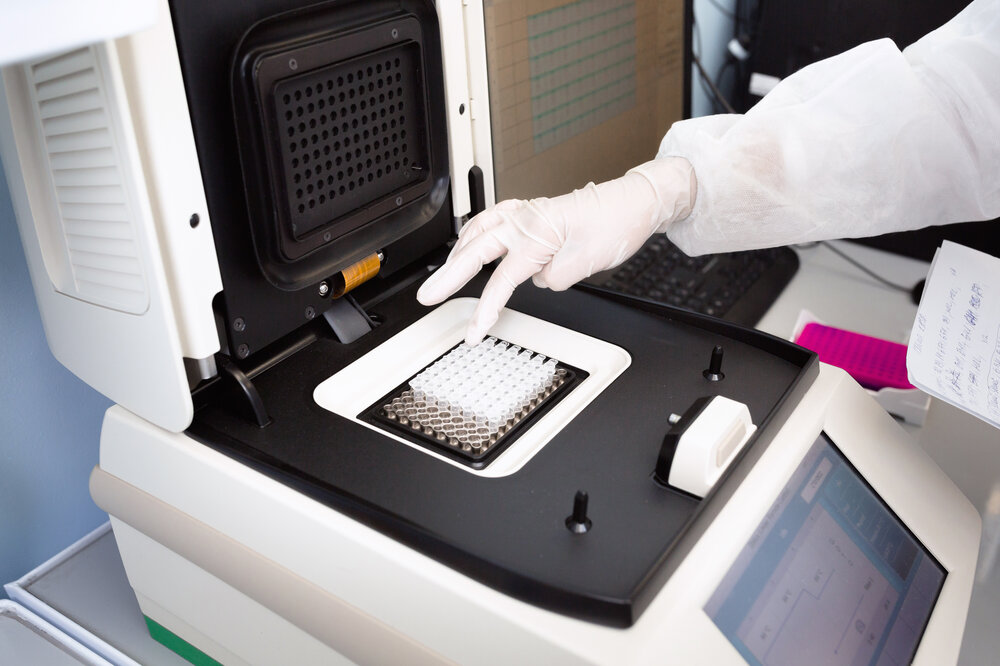
This will be part of learning how to manage uncertainty and expectation when taking the path of a genetic diagnosis. Although it is meant to provide an answer, this may be the beginning of a journey rather than an end.
This is where we, as patient groups, are looking to support by providing trusted, accurate information and explaining and educating on terminology linked to our neuroacanthocytosis (NA) syndromes. This is possible thanks to our dedicated professionals, clinicians and researchers, our trustworthy collaborators for many years.
Equally, patients, their families and carers can contribute enormously by sharing with us their own experiences. Each path is unique and raises unique challenges, and the rare nature of the NA syndromes makes any of this information even more valuable. Details about specialist services in your area that were helpful to you, whether they were free or paid services, specialist tests you were recommended / took or anything that decided the course of action you took next will be valuable to others in the NA community. Please rest assured that your information will stay as confidential as needed, but it can still contribute to building a valuable knowledge base to be shared with our NA community.
 |  |
5k Running Challenge to Raise Funds for our Charities
For Charity Manager Despina Dinca, the 5k running was a personal challenge and also raised funds
by Ginger Irvine
 An inclusive festival dedicated to living with no limits was the perfect opportunity to take up a challenge and try a different kind of fundraising! An inclusive festival dedicated to living with no limits was the perfect opportunity to take up a challenge and try a different kind of fundraising!
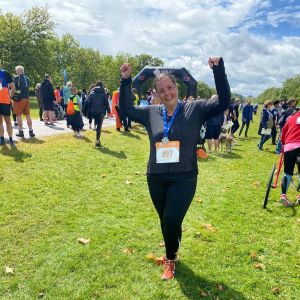 Despina, Charity Manager for The Advocacy for Neuroacanthocytosis Patients, completed the 5k run at Parallel Windsor Festival on Sunday, 7 July 2024. It was as much of a personal challenge as well as a challenge to fundraise for us. Despina, Charity Manager for The Advocacy for Neuroacanthocytosis Patients, completed the 5k run at Parallel Windsor Festival on Sunday, 7 July 2024. It was as much of a personal challenge as well as a challenge to fundraise for us.
Here are her thoughts shared with us after completing the run:
“Been there, done it, got the medal! Outrageous weather!
What a delightful experience the actual festival was! I’ve honestly never been in a place with so much uplifting and inspiring energy. The tag line ‘Start together, finish whenever’ applied to everyone there.
All the rain and stormy weather couldn’t dampen (pun intended) the absolute enthusiasm of every person involved in the challenges and any of the very many and diverse activities of the festival.
Just as the 5k race started, the heavens opened, but I didn't see anyone backing out of it. So ‘Start together’ – tick! ✅
The cheers along the way from the amazing volunteers and the encouragements to each other from those in the running challenge kept everyone going, no matter the pace. It was never about the timings, but about the resilience to cross the finish line. So ‘finish whenever’ – tick! ✅
And once the actual running was done, there was still so much to experience in the many areas of the festival! I’ll only confess to dancing to songs from Grease in a yurt with my best friend who joined me, as we took refuge from the relentless torrential rain.”
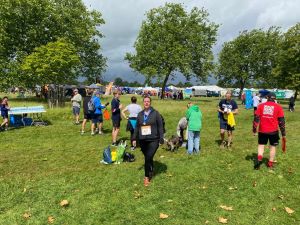 Despina and her friends are planning to return to the inspiring Parallel Windsor Festival next year and perhaps step up a notch the challenge to 10k. So much so that she’s already signed up for the super-early-bird discount for Sunday, 6 July 2025! Despina and her friends are planning to return to the inspiring Parallel Windsor Festival next year and perhaps step up a notch the challenge to 10k. So much so that she’s already signed up for the super-early-bird discount for Sunday, 6 July 2025!
Despina will also be looking to form an international team! The Festival is extended virtually, so wherever you are in the world, you can be part of the NA team!
 |  |
Rare Disease Day 2024 Update
by Despina Dinca
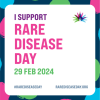 Rare Disease Day (RDD) is the globally coordinated movement on rare diseases, working towards equity in social opportunity, healthcare, and access to diagnosis and therapies for people living with a rare disease. Read on to learn more about how Rare Disease Day 2024 was celebrated by the NA community. Rare Disease Day (RDD) is the globally coordinated movement on rare diseases, working towards equity in social opportunity, healthcare, and access to diagnosis and therapies for people living with a rare disease. Read on to learn more about how Rare Disease Day 2024 was celebrated by the NA community.
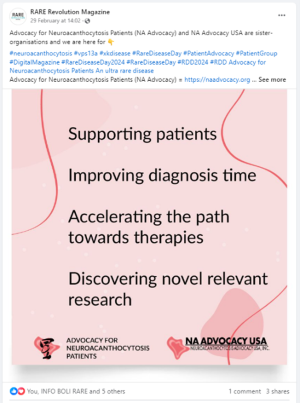 We spoke about our plans for the Rare Disease Day (RDD) on 29 February 2024 In our issue 44 featured article. We’re pleased to report we covered everything we planned for and more! We spoke about our plans for the Rare Disease Day (RDD) on 29 February 2024 In our issue 44 featured article. We’re pleased to report we covered everything we planned for and more!
NA Advocacy & NA Advocacy USA created a special week-long campaign on all our social media channels. The patient stories we shared were by far the most popular features, and we hit a record number of interactions on Facebook, LinkedIn and Instagram!
We were also given the opportunity to take over the social media channels of Rare Revolution Magazine on 29 February. This brought us some new followers interested in what we do!
We also participated in numerous events held on or around the day such as:
It is important to collaborate continuously with other rare disease-oriented organisations, especially umbrella ones who help make our voice heard. As small charities for rare conditions, individually we may not have the resources to power up big campaigns on our own, but uniting our efforts we become stronger, more heard and better known.
RDD was created in 2008, and it takes place every year on 28 February (or 29 in leap years - the rarest day of the year). RDD was set up and is coordinated by Eurordis and 65+ national alliance patient organisation partners. RDD provides an energy and focal point that enables rare diseases advocacy work to progress on the local, national and international levels. (Credit: www.rarediseaseday.org )
As you, our readers, come from all over the world, please don’t hesitate to let us know if we missed anything relevant happening in your country / region. You can drop Despina an email at despinadinca@naadvocacy.org or approach us on any of our social media channels.
 |
|
|
|